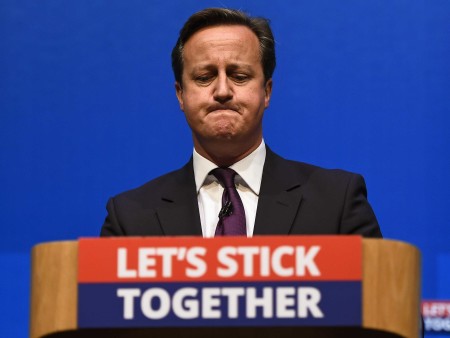Independent think-tank says EU exit will trim 100,000

Migration Watch, an immigration research organisation and think-tank that describes itself as independent but is viewed by many as an anti-immigration pressure group, has published a report examining for the first time what a post “Brexit” (Britain exiting the European Union) immigration regime might look like and estimating its likely effect on net migration to the UK.
In it the lobbyist group says that leaving the European Union would cut UK immigration numbers by more than 100,000 – a figure that would be music to the ears of David Cameron, whose efforts to limit net immigration to “tens of thousands” is failing disastrously but who is nevertheless keen for Britain to remain in Europe.
The group estimates that net migration from the EU – which is the difference between the number of people entering and exiting the UK – would drop from 180,000 to 65,000 per year if the nation were to introduce work permits for EU citizens.
Migration Watch describes immigration as ‘a natural part of an open economy’ and claims to ‘welcome it,’ but only to a certain level. The level of immigration they want is substantially lower than current levels. Currently, this is keeping with the views of much of the UK population. However, in lobbying for tougher immigration controls Migration Watch has been accused of providing inaccurate and misleading information.
James McGrory, who is part of the pro-EU ‘Britain Stronger in Europe’ campaign, described Migration Watch’s claim as ‘misleading’ and ‘another example of fudging the facts.’
European Union referendum
By the end of 2017 and perhaps as early as this summer, Britain is set to hold a referendum as to whether the nation should continue as a member of the European Union. The Migration Watch report looks at possible policies that the UK might implement if the decision was taken to leave the EU. The report then estimates the impact that these policies would have on overall UK immigration numbers.
However, the BBC’s Home Affairs correspondent Danny Shaw pointed out that no-one knows for certain what the impact would be on UK immigration in the event that the UK exits from the EU.
Much of what Migration Watch claims is conjecture and hearsay, after all any impact on UK immigration figures would depend on the terms of any new settlement, which could take months to negotiate and many years to implement.
While Migration Watch argues that leaving would reduce the flow of low-skilled EU workers arriving in Britain, in reality would it really cut net migration numbers? Some commentators say no. They argue that there would be an influx prior to any new restrictions being enforced.
In addition, those who disagree with the Migration Watch report say that businesses that currently depend on workers such as labourers, chambermaids and supermarket shelf-stackers from Europe, would successfully be able to persuade the Government that they be permitted to recruit such workers from elsewhere.
With tighter Tier 2 visa controls coming into effect on April 6, 2016, can the UK really advocate cutting off labour supply from Europe and non-European nations? Moreover, if Britain were to introduce work permits for EU citizens, the EU would introduce work permits for British citizens. Therefore cutting emigration from the UK. This would affect net migration.
The Migration Watch report suggests that an EU exit would result in key immigration changes, including the introduction of work permits for EU nationals. Migration Watch says this would limit the ‘type’ of EU nationals entering the UK to highly-skilled workers, along with their dependants. Such a change would allow entry of students too, but prohibit the entry of low-skilled workers.
Chairman of Migration Watch, Lord Green of Deddington, said: “It’s time to explore potential alternative immigration regimes. Under current arrangements, signs indicate that migration to Britain will continue at a substantial rate for the foreseeable future. Indeed, immigrants tend to generate further migration as their friends and relatives join them in their new countries.”
Lord Green went on to say that the introduction of work permits for EU citizens would reduce net UK immigration numbers substantially and reduce the UK’s population growth and reduce pressure on public services.
Key points
Migration Watch’s 16-page report documents that on average around 20 per cent of EU migrants who arrived in Britain between 2004 and 2014 were in higher-skilled work. The report estimates what would happen if immigration was restricted to highly skilled workers. An excerpt from the report reads: “This could substantially reduce the EU inflow for work to perhaps one fifth of its recent level and would, in turn, substantially reduce net migration by perhaps 100,000 a year from the current level of 180,000.”
However, the report did point out that the figures should not be regarded as a ‘precise estimate’, but was ‘intended to demonstrate the scale of the potential reduction under the policies outlined.’
The report concluded that no restrictions would be needed for EU citizens entering the UK as tourists or students. Additionally, those deemed ‘self-sufficient’ would be free to live in the UK. People would also be allowed to enter the Country to look for work.
No Evidence
James McGrory says that the Migration Watch report only covers one aspect of the debate concerning Britain’s membership of the EU, immigration. He says that this in itself is not a good reason for leaving the European Union.
He said: “Right now, Britain has the best of both worlds. We have an opt-out from the passport-free Schengen area, while still enjoying full access to the single market. The Leave campaigns haven’t produced a shred of evidence to show how they could guarantee a deal that is at least as good if we left.”
The Migration Observatory, based at the University of Oxford, says should it be made more difficult for employers to recruit from within the EU, they would seek to recruit foreigner labour from outside Europe.








